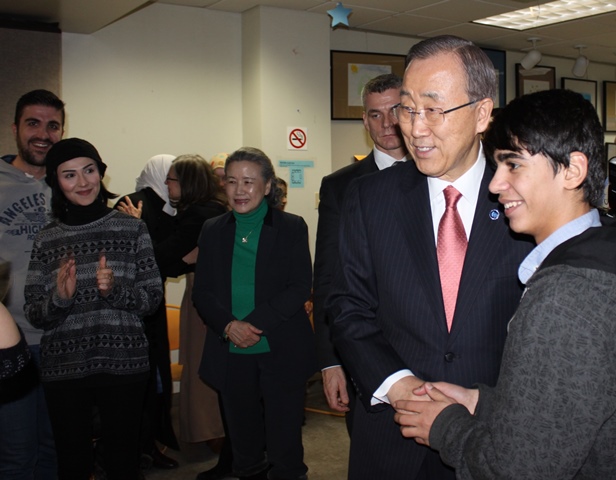“A once in a lifetime opportunity.” That’s how CCI Executive Director Carl Nicholson characterized the informal visit of United Nations Secretary General Ban Ki-moon to the Catholic Centre for Immigrants on Thursday, February 11.
Seven Syrian refugee families who had arrived in Ottawa in December and January were invited to participate in the special visit by His Excellency and his wife, Mrs. Ban Soon-taek. The Honourable Marie-Claude Bibeau, Minister of International Development and La Francophonie, and Ms. Anita Biguzs Deputy Minister of Immigration, Refugees and Citizenship Canada were also on hand.
Handshakes and cell phone photos were the order of the day as His Excellency and his wife made their way around the circle of chairs, greeting newcomers one by one, and leaning down to touch the faces of the excited children. His Excellency then began his remarks to the families by expressing his gratitude to Mr. Nicholson and the Centre for its generous support for the refugees. He praised the “long civilization and culture” of Syria’s people.
His Excellency Ki-Moon noted that the UN was mobilizing record amounts of resources, and “working day and night” to aid those affected by the crisis in Syria, through political negotiations and humanitarian aid. “Do not despair, do not be frustrated,” he told the group, saying that in his childhood his own country, South Korea, “was able to be rescued by the help of the UN.”
Participants took the opportunity during the informal interaction following His Excellency’s remarks to reiterate their gratitude to the Canadian government for the support, and for the honour of the Secretary General’s personal visit. “You’ve put hope again into our lives,” commented one family member.
Prior to His Excellency’s arrival, Minister Bibeau spoke about the work CCI and other Canadian agencies are doing to settle refugees. “You make us look good,” she joked to Mr. Nicholson. “You are doing the big job.” She encouraged everyone to “work hard to learn the language, it’s the key to integration and the key to finding a job.” Deputy Minister Anita Biguzs noted that her parents had been refugees to Canada who spoke neither English nor French, and probably never imagined that their daughter would become a Deputy Minister. She described herself as “very privileged and very humbled” to hold this office “because it has a lot of personal meaning for me.”

